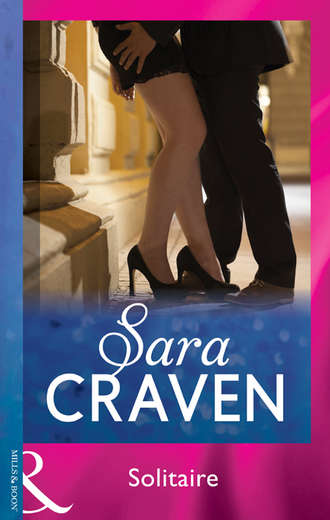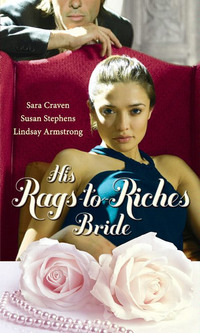
Полная версия
Solitaire
‘Oh.’ Marty digested this with a pang. She could not understand why Uncle Jim had given her no inkling of this in his letter. She could appreciate that he might be reluctant to admit that his venture into matrimony had been a failure, but surely the existence of a child made some mention of it obligatory. She wondered how old Bernard was, but was reluctant to ask Jean-Paul. Certainly Uncle Jim had left it late in life to marry. At her reckoning he must be at least in his late fifties by now, and she had always thought of him as the eternal bachelor, which was silly in a way as she was sure he had been in love with her mother and would have married her eventually.
She realised unhappily that she was feeling jealous and scolded herself for her selfishness. Just because she had always had this idea that Uncle Jim and she would be on their own, she had not bargained for a third party, especially one who could claim a closer relationship than she could.
And there was another strange thing. She was sure Uncle Jim’s letter had said she was his only relative. Had the failure of his marriage embittered him against his son, so that he refused to acknowledge the relationship? With a sinking heart, it occurred to her that the haven she had envisaged might in fact contain stormier waters than she had ever encountered before.
They were out of the town by now, and driving along a narrow rather twisting road flanked by small neat houses whose pristine paintwork gleamed in the sun. There seemed to be sand everywhere—banked at the side of the road, and covering what earth there was in the gardens which seemed to be assiduously cultivated in spite of this. She could see a number of women, some of them wearing attractive sun-bonnets, working with hoes between neat rows of plants.
Beyond the houses she could see the deep brooding green of the pine forests, and it was not long before the houses became more scattered and gave way to the trees.
Jean-Paul glanced sideways at her rapt face and grinned. ‘It would have been a long, hot walk for you,’ he commented, and she was forced to agree. On each side of the narrow road, the banks rose steeply, the grass giving way to what seemed to be gorse bushes. Beyond this rose the trunks of the pine trees, dark and mysterious. But even here in the forest there were signs of habitation. Plots of land had been cleared and smart white houses had been erected. Jean-Paul explained that these were mainly occupied by holidaymakers on a seasonal basis.
‘In some of them the arrangements are fairly primitive,’ he said. ‘But don’t be nervous. Your uncle’s house is not like that. In fact, according to Madame Guisard, your uncle’s housekeeper, it is the last word in luxury.’ He smiled at her. ‘Madame Guisard is the aunt of Madame Benedict, who has the restaurant where you had lunch. That is why I am so well informed.’
Marty had to laugh. ‘Thank you, Jean-Paul. I’m sure that to be forewarned is forearmed.’
‘Comment?’ He wrinkled his brow, and she realised that she had not made her meaning clear. She was casting around for another way of expressing herself, when he began to slow down. They had passed a number of tracks leading into the forest—some leading to houses, others to nature trails and picnic areas, but the track Jean-Paul was turning into was guarded by a high white gate. Marty’s eyes ran over the notice on a stark white board standing beside it. ‘Défense d’entrer, sous peine d’amende. Chien méchant.’ She swallowed. So trespassers on the Villa Solitaire land would be prosecuted and also had to beware of the dog. It wasn’t the most welcoming of prospects. But she wasn’t trespassing, she protested inwardly, she had been invited there, and she only hoped that the dog would appreciate the subtle difference. She wished very much that she had taken the precaution to telephone Uncle Jim before leaving Les Sables, but now they were here she could hardly request Jean-Paul to drive her to the nearest callbox.
Suppressing a little sigh, she prepared to climb out of the car. Jean-Paul was also out, retrieving her case which he carried over to the gate. He stood waiting for her to join him.
‘You wish me to accompany you?’ he asked.
Marty shook her head. In spite of her misgivings, she had a strong feeling that her reunion with Uncle Jim was likely to be an emotional one, and she did not particularly want any witnesses.
‘No, thank you, Jean-Paul.’ She held out her hand for him to shake. ‘You’ve been very kind.’
He shrugged. ‘Pas de quoi.’ He held on to her hand and she felt her cheeks grow warm under his intent gaze. ‘You realise that I don’t even know your name, although you know mine. That is hardly fair.’
‘I suppose not. My name is Martina—I suppose you would say Martine.’
‘Martine.’ He smiled. ‘It’s a pretty name. And are you going to let me see you again, Martine? You cannot intend to devote the whole of your vacation to your uncle.’
Her flush deepened. ‘Er—thank you, Jean-Paul. I’d like that.’
‘I’ll telephone you, then,’ he promised. ‘Au revoir, Martine.’ He walked back to the car and got in. With a hesitant hand set on the latch of the gate, Marty turned to watch him go. He swung the car round with an expert flick, and then leaned out of the window to shout back to her.
‘Don’t be afraid, chérie. The dog won’t bite you—although the owner might!’ And he drove off laughing.
‘Thank you for nothing,’ Marty muttered half under her breath. She pushed tentatively at the gate and it gave way, opening with a protesting squeal of hinges. She began to walk up the sloping sandy track, littered with pine needles and fir cones. Above her the trees seemed to close over her head, so that she appeared to be in a dim green tunnel. She stumbled slightly as her foot caught against a hidden obstacle, and paused to transfer her case to the other hand. The track had curved slightly and she could no longer see the road. A solitary house was right, she thought.
She was disturbed at the apparent change in the Uncle Jim she remembered. Yet his letter had seemed full of the old warmth and affection. Why then did he erect a high gate and warning notices at the entrance to his property? Was he afraid of thieves and vandals, or had age simply made him eccentric? The genial burly figure she remembered from childhood would have dismissed such precautions with contempt, she thought with a sigh.
She walked forward once again over the rutted path. It was very quiet in the forest. She supposed the beach must be quite close at hand, yet she could hear no sound of the sea. There was a faint whisper of a breeze in the branches above her head, and an incessant chirping of insects in the undergrowth, but as far as other human beings were concerned, she could have been alone in the world.
The track curved again, and suddenly the house was in front of her, standing in a large clearing on top of a rise, looking as inviting as it had done in the photograph. Marty paused and set the case down, wiping damp palms down the denim jeans which clung to her hips and thighs, and twitching the cheesecloth smock she wore with them into place. Her mouth felt dry and she passed her tongue nervously over her lips.
‘Oh, please be glad to see me,’ she whispered as she moved forward again up the rise towards the front door. ‘Oh, please . . .’
She never even heard the dog come. One moment she seemed quite alone, and the next the animal was in front of her, its front legs splayed menacingly, its lip curling back in an unmistakable snarl.
Without the slightest conviction in her voice Marty said, ‘Good dog. Good boy, lie down.’ She wondered if she ought to extend her hand in friendship, but decided against it. The dog might misunderstand, and she might need that hand again one day.
She took another step forward and froze as the dog snarled again, then lifted its voice in a full-throated bark that held a clear warning that she was to keep her distance.
Marty glanced round nervously. Why didn’t someone come? Uncle Jim, for preference, but even this Madame Guisard would do at a pinch. She tried calling out, ‘Is anyone there?’ first in English and then in French, but no one answered, and she felt a cold prickle of fear at the nape of her neck. Was the house deserted then except for this dog, only too aware of his role as guardian and protector? She had a feeling that any movement, even one of retreat, would be fatal. All she could do was stand there, and hope that the big animal would restrict himself to this threatening surveillance. At the same time, she was not sure how long she could go on standing there. Her legs were shaking under her suddenly, and she could feel the sun blazing down on her unprotected head, and the case weighing down almost unbearably on her arm.
She called out again, uncaring that there was now a note of panic in her voice—‘Please—someone . . .’—and heard almost unbelievingly the sound of an approach, an unmistakably masculine stride, and closed her eyes with a little sob of relief. Uncle Jim—it had to be.
When she opened them again, trees, sky and house swam a little under her gaze and a droplet of sweat ran down her face. She put up her free hand and wiped her eyes because she seeemd to be suffering from the strangest illusion. The image on the snapshot in her handbag had suddenly been reproduced all over again.
She looked at the newcomer, her lips slightly parted. Tall, and very dark, and even more deeply tanned than Jean-Paul, and making no secret of it either, for all he appeared to be wearing was a pair of closely fitting white denim jeans slung low on his lean hips. A thin face with high cheekbones, and an uncompromising beak of a nose. A harsh face, belied only slightly by the sensual curve of his lower lip.
Marty took a step forward encouraged by the fact that the dog was quiet now, crouched at his feet, with one restraining hand on his collar.
She said uncertainly, ‘Bernard?’
She could hardly believe it. This man was in his thirties. Had Uncle Jim been married all that time and never disclosed the fact? It seemed incredible.
She heard him give a slight intake of breath, so it seemed she had guessed right.
He said in English with only a trace of an accent, ‘Who are you, and what do you want here? Didn’t you read the notice?’
Dark eyes under heavy lids went over her in a kind of contemptuous dismissal that flicked Marty on the raw.
She said hotly, ‘I don’t call that much of a welcome.’
‘I don’t feel particularly welcoming. Be good enough to state your business and leave.’
Marty flung her head back and stared him straight in the eye. She said silkily, ‘You may not be expecting me, Bernard, but your father is. So please take me to him.’ She waited, but there was no response except a slight narrowing of the dark eyes, and a faint unpleasant smile curling his lips. ‘Did you hear me, Bernard?’ she asked eventually.
‘Oh, I heard you, mademoiselle. I am just asking myself what little game you’re playing. However, it seems you wanted to see me, so here I am.’
‘I want to see your father . . .’ she began, but he interrupted, his voice cold with suppressed anger.
‘Au contraire, mademoiselle, you said you wanted to see Bernard’s father. Well, I am Bernard’s father.’
She stared at him. ‘But you can’t be! I mean . . .’ She put her case down and took another step forward. ‘I think it’s you that are playing games, monsieur. What are you—some sort of bodyguard? It all fits in with the gate, and the notice and the dog. Has Uncle Jim suddenly become a millionaire?’
He stood very still, and she saw his brows draw together in a swift frown. ‘Whom did you say?’ he asked. ‘You spoke of an uncle?’
‘Yes,’ she said wearily, wishing that he would at least permit her to enter the house, and continue this futile conversation in the shade. She only wished that Uncle Jim would suddenly appear and put him in his place. ‘My uncle—James Langton. He owns this villa.’
The tension in the air between them was suddenly almost tangible.
‘You are mistaken, mademoiselle,’ he said bleakly. ‘I own this villa. Your—uncle, Monsieur Langton, sold it to me just over a year ago.’
CHAPTER TWO
MARTY stared at him, her heart beating so wildly that she had the oddest sensation that it might leap into her throat and choke her.
‘But that’s impossible!’ she managed at last.
‘Au contraire, mademoiselle, it is not merely a possibility, but reality.’ He spoke almost wearily. ‘As I suspect you knew before you ever set out on your travels. Accept my felicitations on the depth of your research and commiserations that it has not had the desired effect.’
‘I don’t know what you’re talking about,’ she said helplessly. ‘But if Uncle Jim really isn’t here, perhaps you can tell me where he has gone.’
The firm mouth curled slightly as if in distaste. ‘You should have continued your research, ma petite, then you would have discovered the answer to that for yourself.’
‘Please stop talking in riddles,’ she begged wearily. ‘I don’t understand what’s going on. You say Uncle Jim sold you this villa a year ago, Did he go away, then?’
The stranger paused, his dark eyes raking over her. ‘Not immediately, no. Is it important?’
‘Yes.’ Marty fumbled at the catch of her shoulder bag. ‘You see, I had a letter from him only three weeks ago asking me to come and live with him and . . .’
He interrupted sharply, his frown deepening. ‘Three weeks? To turn your own words against you, mademoiselle, that is impossible.’
‘But I can show you the letter,’ she began.
‘I am sure you can.’ His look of contemptuous derision scourged her. ‘But I think it’s time I called a halt to this little game you’re playing. Your pretence is in the worst of bad taste under the circumstances. I suppose I can admire your determination to carry it through, but that is all I admire.’
‘I don’t want your admiration.’ In spite of her bewilderment, Marty felt her own temper begin to rise under the lash of the man’s words. How dared he treat her like this! she stormed inwardly. If she had trespassed on his property and his time then it was quite inadvertent. ‘In fact, I don’t want any part of you,’ she went on stonily, ignoring the look of frank scepticism he sent her. ‘If you’ll be good enough’—she stressed the words sarcastically—‘to tell me where Mr Langton has gone, then I’ll be on my way.’
‘Perhaps the truth will shame you into abandoning this ridiculous charade,’ he said harshly. ‘Jacques Langton is dead, mademoiselle, and has been so for the past four months. That is why I know you are a fraud, and that is why I am ordering you to leave—now.’
‘Dead!’ Marty repeated the word mechanically, her mind oblivious to everything else he had said. Then, as the full realisation finally dawned on her, she gave a little anguished cry. ‘Dead? Oh, Uncle Jim, no!’
She gave a desperate look around her at the house, and the brooding pines and the tall inimical figure of the man confronting her, then the great golden disc of the sun came swooping down at her, and she gave a little moan and collapsed to the ground.
The sun seemed to be all about her. She felt as if she was bathed in fire. There were even slow flames forcing themselves between her lips and trickling down her throat, and she began to struggle against them, pushing them away, and pressing her hands to her mouth.
‘Don’t be a little fool.’ She recognised the voice at once, and sat up with a gasp. ‘It’s only cognac. You fainted—remember?’
She was lying on a sofa inside the villa, in a long room full of light. The walls and carpeting were some pale subtle shade between cream and mushroom, and one wall was glass from floor to ceiling giving access to a paved patio. The only real colour in the room came from the abstract paintings hanging on the wall above the empty fireplace, and above the sofa where she was lying, which appeared to be the work of the same artist.
One half of her brain seemed to register these details quite coldly while the other cried out in protest as she did indeed remember only too well what had passed between them. She felt nauseated, and she knew too that she was going to cry, feeling her face begin to crumple like a child’s.
But I can’t, she thought agonisedly, I can’t cry in front of him, even as the first sobs tore harshly at her chest. The tears were slow and scalding at first, grief and shock mingling with loneliness and disappointment as the full extent of her loss came home to her. It was something she was unable to control even though it was a degradation to expose her emotions in front of this man.
At last she sat motionless, her face buried on her arm against the cool leather of the sofa, then with a long quivering sigh she dragged herself upright on to her feet.
‘I’m sorry,’ she said remotely. ‘I—I’ll go now.’
He had been standing with his back to her, staring out of the window and she supposed she should be grateful to him for that.
‘Wait.’ He swung round at the sound of her voice. ‘Either you’re a better actress than I gave you credit for, or I have done you an injustice. Which is it? Tell me the truth.’
‘I don’t have to tell you anything.’ She bent and picked up her bag which was lying on the floor at her feet. ‘What have you done with my case?’
He walked over to her and took her chin in his hand. She wanted to snatch herself away from him, but made herself stand very still and endure his touch.
‘The tears were real,’ he said half to himself. ‘And an actress surely would have learned to cry prettily and not allow her eyes to become swollen and her nose red.’
‘Thank you,’ she said ironically. ‘Now may I go, please?’
‘In a moment. You came here in your own good time. You will depart in mine.’ He released her and walked over to the door. ‘Albertine!’
A thin woman appeared so promptly that she might have been hovering on the threshold waiting for the summons.
He said in French, ‘Take Mademoiselle to the bathroom, and see that she has all that she needs. She has had a great shock.’
The woman nodded, her dark eyes avid with curiosity as they rested on Marty. She tutted briskly and placed a hand on her arm, urging her towards the door.
‘I don’t want to use your bathroom,’ Marty said tightly. ‘I don’t want any help from you. I just want to get away from here.’
He gave her a cool look. ‘You need to wash your face before you do anything, mademoiselle.’
Rebellion welled up in her, but she caught sight of the housekeeper obviously relishing every minute of this passage at arms between her employer and his unexpected guest, and bit back the angry words trembling on her lips.
She accompanied the woman out of the room and into a large hall, its floor coolly tiled. A shallow flight of stairs led up to the first floor, and the woman guided Marty up these and along the gallery above to the bathroom.
Left alone in the bathroom once she had been supplied with a fresh bar of exquisitely scented soap and a small rather harsh-feeling linen towel, Marty stared around at her surroundings. At any other time, she would have been bound to appreciate the exquisite tiling of the walls and floor in shades of beige and rust and amber, as well as the magnificent appointments, including a luxurious shower cubicle, but now it was as much as she could do to run some water in the marble basin and splash it over her face and wrists. Although she hated to admit it, the touch of the water was refreshing, and by the time the woman who she realised must be the Madame Guisard that Jean-Paul had mentioned had returned, the more obvious marks of grief had vanished, although she still looked pale and red-eyed.
As they returned downstairs, Marty saw her case standing in the hall below. It looked forlorn and out of place, stationed next to a large wooden chest that was clearly an antique. As out of place as she was herself, she thought. And what had Uncle Jim had to do with all this restrained elegance?
Madame led her across the hall and tapped almost deferentially on the partially opened door to the salon.
‘Mademoiselle is here, monsieur,’ she annnounced, accompanying the words with a little push as if she sensed Marty’s reluctance to face the new master of the house once again.
‘So I see.’ He was seated, his muscular limbs relaxed in one of the massive hide chairs that flanked the fireplace. ‘You had better bring some tea, Albertine. That is the English stimulant, is it not, and Mademoiselle did not care for the cognac.’
‘I don’t want anything,’ Marty protested.
‘Some tea, Albertine.’ He repeated without haste. He waved a hand at the chair opposite. ‘Be seated, mademoiselle, and let us see if we can get to the bottom of this affair.’
She hesitated for a long moment, then sat down tensely on the very edge of the seat.
He waited until the door had closed behind Madame Guisard, then said in a slightly gentler tone than he had used so far, ‘Is it true that you are the niece of Jacques Langton?’
‘Not exactly.’ Marty moistened her lips. ‘He was my father’s cousin,’ she went on hurriedly, seeing the now familiar look of scepticism on his face. ‘I—I always called him my uncle.’
‘I understand. Under the circumstances I regret that I broke the news of his death to you quite so bluntly.’
‘It doesn’t matter,’ she said quietly. ‘After all, it doesn’t alter anything, and I had to find out some time. There’s no easy way to break that sort of news.’ She took a deep breath. ‘Can you tell me a little more about it?’
He gave a slight shrug. ‘There is little to tell. Jacques had suffered from a weak heart for some time. He had three attacks and the last one killed him. It was very sudden and very quick. Is that what you wanted to know?’
‘I suppose so,’ she said after a pause. ‘I’m glad he wasn’t an invalid for any length of time. He would have hated it so.’
‘That is true.’ He leaned back in his chair, his eyes going over her from head to foot, frankly and deliberately assessing her, so that in spite of herself she felt herself flushing under his all-compassing gaze. ‘What I cannot understand,’ he went on after a moment, ‘is why when I asked Jacques after the first attack if there was anyone in England whom I should contact, he told me there was no one. How do you explain that?’
‘I wouldn’t even begin to try,’ she said rather hopelessly. ‘Any more than I can explain why he should write to me offering me a home that was no longer his.’
‘Are you sure the letter came from him?’
‘Absolutely certain.’
‘May I see it?’
Her handbag was no longer on the floor, but lying on the sofa. She found the letter and passed it to him. As their fingers brushed fleetingly, she was conscious of a curious tingling sensation, and her flush deepened. She tried to tell herself that it was because of her overcharged emotional state that she felt this strange new heightened awareness, but the explanation was not wholly convincing. She found herself glancing at him from beneath her lashes as he sat reading the letter and frowning a little. He seemed completely at ease, but then why shouldn’t he be, in his own home? She was being idiotic. He was quite entitled to behave as he liked, but this did not stop her wishing that he would go and put a shirt on. She had never realised before what an exclusively feminine environment she seemed to have inhabited all her life. Even Mr Leslie whose secretary she had been had been a prissy, old-maidish kind of man, always rather fretfully searching for his pen and his spectacle case.
She had thought Jean-Paul was attractive, but this was before she set eyes upon this man whom even her lack of sophistication could recognise had come to terms with his own virility a long time ago, and no longer needed to prove anything about himself to anyone.
As she watched he reached for a pack of cigarettes on the table beside his chair, and selected one with a practised flick of his wrist. Even that most conventional of movements was enough to set the muscles rippling across his shoulders and chest where the dark mat of hair grew so thickly, tapering down his flat stomach to disappear inside the waistband of his pants.








